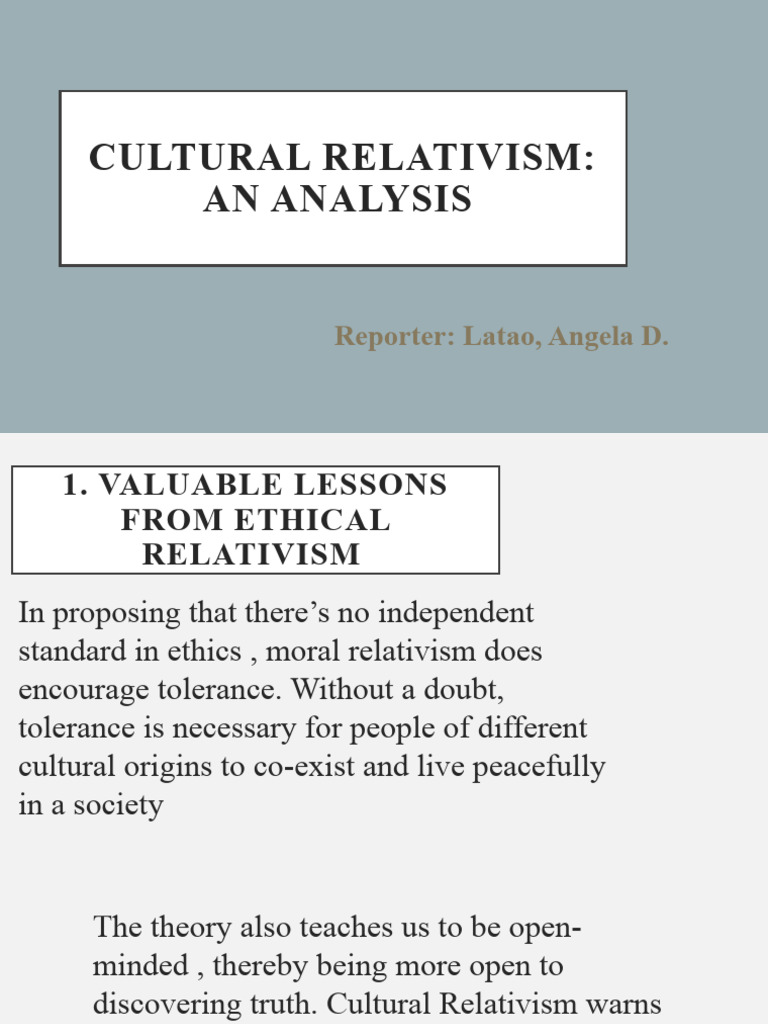In a world woven from myriad cultures, the intricate tapestry of human morality presents a captivating challenge: how do we reconcile our ethical beliefs with the cultural contexts that shape them? The discourse surrounding ethical relativism and cultural relativism is not merely an academic debate; it is a profound exploration of our humanity.
To embark on this journey, we must first delineate the distinctions between ethical and cultural relativism. Ethical relativism posits that moral truths are contingent upon individual perspectives or societal norms. Under this doctrine, a belief may hold validity in one context while being entirely ungrounded in another. In contrast, cultural relativism asserts that a person’s beliefs and practices should be understood in the context of their own culture, emphasizing the idea that no culture’s ethics are superior to another’s.
This distinction serves as the crux of numerous philosophical inquiries. Imagine two travelers in a foreign land; one clings to their map of ethical principles as gospel, while the other embraces the fluidity of cultural practices around them. Each perspective offers insight, yet both are riddled with complexity and nuance. The traveler with the map may find themselves lost in a foreign moral landscape, unable to navigate feelings of cultural dissonance. Conversely, the open-minded traveler risks unmooring themselves from the solid ships of ethical conviction, drifting into a moral quagmire.
At the heart of ethical relativism lies the belief that moral judgments are inherently subjective. This view resonates strongly in contemporary discussions on social issues. For example, what one culture may deem acceptable, such as arranged marriages or gender roles, may be perceived as draconian by another. Ethical relativism thus challenges us to examine whether morality is universal or deeply localized. Are we mere products of our environments, or do we possess an intrinsic sense of right and wrong? The ethical relativist would argue the former, emphasizing that moral frameworks are indelibly stamped by culture.
However, this viewpoint is not without its detractors. Critics argue that ethical relativism can lead to moral nihilism, where any action, no matter how repugnant, can be justified within its intrinsic culture. Think of the philosopher’s quip: “If everything is permissible, then nothing is.” This conundrum invites a deeper interrogation of ethical absolutes. Can one accept practices such as slavery or genocide simply because they are culturally endorsed? The perils of ethical relativism prompt a necessary dialogue between the need for cultural sensitivity and the responsibility to uphold fundamental human rights.
Conversely, cultural relativism provides a refreshing lens through which to view ethical dilemmas. It reminds us that our moral compasses are often shaped by tradition, history, and collective experience. The doctrine encourages cultural humility and promotes the idea of moral diversity. However, cultural relativism can also entrap individuals within the very traditions that may need to be reevaluated. Consider the plight of those advocating for change within oppressive systems; their arguments are often stifled by a rigid adherence to cultural practices. Thus, while cultural relativism fosters an appreciation for diversity, it can simultaneously inhibit moral progress.
This juxtaposition sets the stage for a critical examination of the morality of cross-cultural interactions. When confronted with practices that starkly contrast with one’s own ethical beliefs, questions arise: Should one engage in cultural practices that clash with their moral compass? Is it ethical to intervene in the customs of another group? Striking a balance between respecting cultural diversity and advocating for universal human rights can prove to be an ethical tightrope walk.
Moreover, the appeal of both relativisms lies in their ability to illustrate the landscape of moral philosophy as a vast and undulating terrain. Ethical dilemmas appear like mountains, imposing and formidable, while cultural nuances form valleys that cradle diverse perspectives. To traverse this landscape requires not only wisdom but also empathy; a willingness to entertain the discomfort of moral ambiguity. It is this very discomfort that can serve as a catalyst for deeper understanding and introspection.
Yet, one cannot dismiss the foundations of ethical relativism and cultural relativism without considering the confluence of these ideas in contemporary discourse. Globalization has ushered in an era of unprecedented cultural exchange, leading to a growing awareness of diverse moral frameworks. In a world marked by environmental degradation and climate crisis, ethical considerations are desperately needed. As humanity grapples with climate change, the intersection of cultural beliefs and ethical paradigms becomes critical. Should the global community impose a singular set of environmental ethics, or should the voices of indigenous cultures—whose practices offer sustainable alternatives—be amplified?
The quest for understanding does not yield easy answers. Just as the colors of a sunset are composed of various pigments, the ethical landscape is enriched by multiple perspectives. As we engage in discussions surrounding climate action and social justice, we must recognize the interdependence of ethical and cultural relativism, an intricate interplay where neither can exist in isolation.
In conclusion, the realms of ethical and cultural relativism beckon us to abandon binary thinking. They invite us instead to embrace a paradigm of moral pluralism, one that celebrates the rich tapestry of human experience while seeking common ground. By navigating these philosophical channels, we bolster our resolve to advocate for justice and equity, respecting the diverse cultural narratives that shape our shared existence on this planet.
